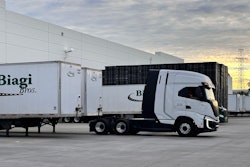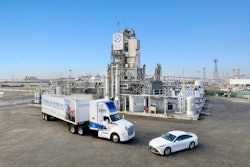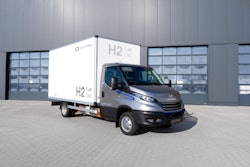Trucking news and briefs for Monday, Oct. 16, 2023:
Georgia expands Drivewyze Smart Roadways service
The Georgia Department of Transportation (Georgia DOT) recently announced that it has expanded its deployment of real-time traffic alerts through Drivewyze’s Smart Roadways service. The expansion provides commercial truck drivers access to heavy congestion and slowdown traffic alerts across 1,400 miles of interstate and state highways in Georgia, nearly tripling the connected roadways in the state since deploying the service in 2022.
Drivewyze Smart Roadways traffic alerts notify truck drivers about hazards, such as where drastic speed changes or heavier than normal congestion is detected, using visual messages such as “sudden slowdown ahead” along with an audible chime. The alerts allow ample time for trucks to slow down or stop.
According to NHTSA, nearly a third of all collisions that occur happen on interstates, and many of those are due to secondary incidents, where a vehicle is rear-ended from an initial incident.
“Smart Roadway traffic alerts allow us to effectively inform a large percentage of truck drivers to slow their speeds when approaching unexpected traffic or hazards,” said Ben Lempke, assistant ITS engineer for the Georgia DOT. “The alerts are having a positive impact on driver behavior. We believe they are helping prevent potentially catastrophic collisions involving heavy trucks from happening, which is why we expanded the use of the service.”
According to Lempke, telematics data from a 2020 pilot test in the Atlanta area with more than 500,000 vehicle visits, showed between a 10% and 16% reduction in hard braking events for drivers who received the alert, compared to those who did not.
In addition to Georgia, the alerts are available in six other states – Delaware, New Jersey, North Carolina, Ohio, Virginia, and the Pennsylvania Turnpike. More states are expected to be added in the near future.
DOE grants $7 billion to start regional hydrogen hubs
The U.S. Department of Energy (DOE) on Friday announced $7 billion to launch seven Regional Clean Hydrogen Hubs (H2Hubs) across the nation and accelerate the commercial-scale deployment of low-cost, clean hydrogen.
Funded by President Biden’s Bipartisan Infrastructure Law, the seven H2Hubs will kickstart a national network of clean hydrogen producers, consumers, and connective infrastructure while supporting the production, storage, delivery and end-use of clean hydrogen. The H2Hubs are expected to collectively produce three million metric tons of hydrogen annually, reaching nearly a third of the 2030 U.S. production target and lowering emissions from hard-to-decarbonize industrial sectors that represent 30% of total U.S. carbon emissions.
Slated projects include Appalachian Hydrogen Hub, serving West Virginia, Ohio and Pennsylvania; California Hydrogen Hub; Gulf Coast Hydrogen Hub in Texas; Heartland Hydrogen Hub, serving Minnesota, North Dakota and South Dakota; Mid-Atlantic Hydrogen Hub, serving Pennsylvania, Delaware and New Jersey; the Midwest Hydrogen Hub, serving Illinois, Indiana and Michigan; and Pacific Northwest Hydrogen Hub for Washington, Oregon and Montana.











